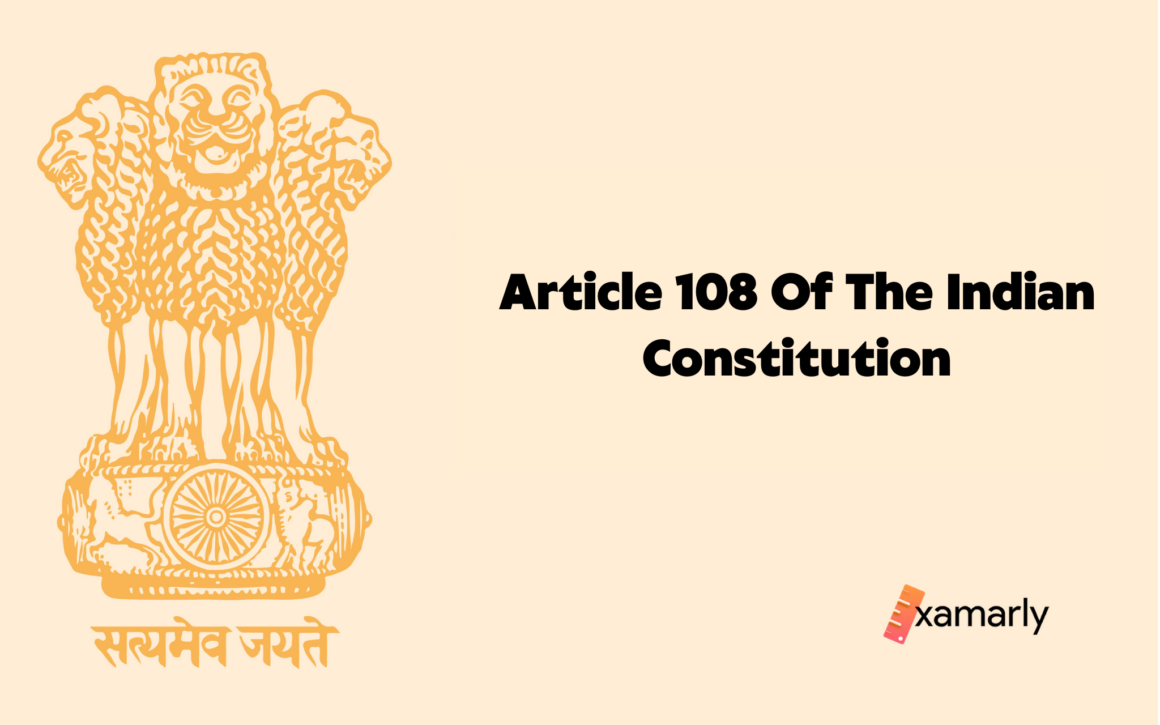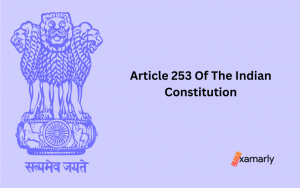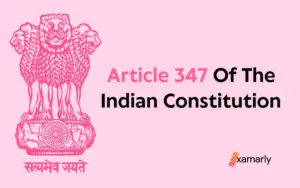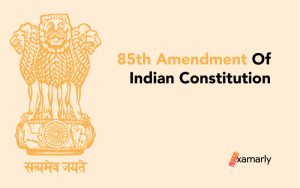Article 108 of the Indian Constitution reflects on the Joint Sittings of both the Houses of Parliament. It also reflects on how, why, and when the President of India would interfere and takes charge of the matter..
It is one of the most important Articles among others as it gives a clear picture of how the process of making a law gets expedited in a scenario where it is getting delayed.
Let us now understand each and every concept in depth by analyzing each and every clause and subclause of Article 108 of the Indian Constitution.
Article 108 Of The Indian Constitution – In Depth
Clause 1 – As it is and Explained
“108. Joint sitting of both Houses in certain cases
(1) If after a Bill has been passed by one House and transmitted to the other House
(a) the Bill is rejected by the other House; or
(b) the Houses have finally disagreed as to the amendments to be made in the Bill; or
(c) more than six months elapse from the date of the reception of the Bill by the other House without the Bill being passed by it the President may, unless the Bill has lapsed by reason of a dissolution of the House of the People, notify to the Houses by message if they are sitting or by public notification if they are not sitting, his intention to summon them to meet in a joint sitting for the purpose of deliberating and voting on the Bill: Provided that nothing in this clause shall apply to a Money Bill”
The first clause of Article 108 of the Indian Constitution says that the Joint Session of both Houses in certain cases shall be held.
If the Bill has been passed from one House and has been transmitted to the other House. Then, the following sub-clauses of clause 1 are the cases in which the Join Sessions of both Houses will be held.
(a) In a situation where the Bill has been rejected by the other House. Like, suppose Lok Sabha has passed the Bill, and now it has been transmitted to the Rajya Sabha, and the Rajya Sabha has rejected the Bill.
(b) In a situation where the Houses have disagreed with the amendments that are to be made in the Bill.
(c) To understand this subclause, let us assume a situation where the Bill has been passed by the Lok Sabha and the Bill is now transmitted to the Rajya Sabha. Now, six months have passed and there is no action on the Bill yet by the Rajya Sabha.
In this situation, there will be two scenarios further. If six months are passed now and the bill is unattended, then if the Lok Sabha gets dissolved then the pending Bill will be deemed as lapsed Bill and the new Bill will have to be introduced once Lok Sabha commences its new session.
The other scenario is that if six months have passed and the Bill is unattended, but this time Lok Sabha is not getting dissolved for any reason. Then, the President of India will notify both Houses by message if they are sitting or by public notification, if they are not sitting to hold a joint session so that the due Bill can be discussed and voted on for further action to be taken on the Bill.
The important point here to keep in mind is that this clause will only apply to all the Bills expect the Money Bill. The Money Bill has to pass only in the Lok Sabha and the Rajya Sabha has no authority to take decisions on Money Bill.
Related Articles
- Article 94 Of The Indian Constitution
- Article 107 Of The Indian Constitution
- Article 67 Of The Indian Constitution
Clause 2 – As it is and Explained
“(2) In reckoning any such period of six months as is referred to in clause ( 1 ), no account shall be taken of any period during which the House referred to in sub-clause (c) of that clause is prorogued or adjourned for more than four consecutive days”
The second clause of Article 108 of the Indian Constitution reflects on the probable calculation with regard to the scenario mentioned in subclause (c) of clause 1.
It says that the 6 months will be calculated excluding all the non-working days or such days where the House has been temporarily adjourned. So, no holidays and any other non-working day will be included in the calculation of the six months. In the period of 180 days, all the 180 days have to be working days.
Clause 3 – As it is and Explained
“(3) Where the President has under clause ( 1 ) notified his intention of summoning the Houses to meet in a joint sitting, neither House shall proceed further with the Bill, but the President may at any time after the date of his notification summon the Houses to meet in a joint sitting for the purpose specified in the notification and, if he does so, the Houses shall meet accordingly”
Clause 3 of Article 108 of the Indian Constitution says that neither House shall proceed with the Bill before the Joint Sitting once the President has notified the Joint Sitting. The President if wants may ask the Houses to meet in a joint sitting for the purpose that he has specified in this notification.
If the President asks so, the Houses have to meet and comply with the notification.
Clause 4 – As it is and Explained
“(4) If at the joint sitting of the two Houses the Bill, with such amendments, if any, as are agreed to in joint sitting, is passed by a majority of the total number of members of both Houses present and voting, it shall be deemed for the purposes of this Constitution to have been passed by both Houses: Provided that a joint sitting
(a) if the Bill, having been passed by one House, has not been passed by the other House with amendments and returned to the House in which it originated, no amendment shall be proposed to the Bill other than such amendments (if any) as are made necessary by the delay in the passage of the Bill;
(b) if the Bill has been so passed and returned, only such amendments as aforesaid shall be proposed to the Bill and such other amendments as are relevant to the matters with respect to which the Houses have not agreed; and the decision of the person presiding as to the amendments which are admissible under this clause shall be final”
The fourth clause of Article 108 of the Indian Consitution says that if a Bill is being voted on at the Joint Sitting, then if the Bill has been agreed upon by the majority through voting of the members of both Houses, then the Bill will be considered to be passed from both the Houses.
The sub-clauses of this clause also mention the special scenarios with the Bill at the Joint Sitting. Let us get to understand these sub-clauses in detail.
(a) Let us assume a scenario where a Bill has been passed by the Lok Sabha at the Joint Sitting but has not been passed by the Rajya Sabha. Then, in such case, the Bill will be returned back to the Lok Sabha as it originated from there, and only those amendments will be considered to discuss, that are mandatory and are important to pass the Bill.
(b) Now, considering the above scenario where the Bill has been passed upon considering the amendments that are necessary to pass the Bill, other such amendments that are also relevant to the matter and are not being agreed upon, will be decided by the person who is presiding the sitting. The Presiding person could be the Speaker, The Deputy Speaker, among others who can hold the authority to preside.
Clause 5 – As it is and Explained
“(5) A joint sitting may be held under this article and a Bill passed thereat, notwithstanding that a dissolution of the House of the People has intervened since the President notified his intention to summon the Houses to meet therein”
The fifth clause of Article 108 of the Indian Constitution says that the Joint Sitting has to be held once the President summons the Houses to meet. The joint sitting has to be held even after the Lok Sabha gets dissolved after the summon of the President.
Summing Up
Article 108 of the Indian Constitution is an important Article as it reflects on the protocols and procedures upon which the Parliament would function in a case where a discussion on a Bill is getting delayed. The Parliament does not necessarily hold the Joint Sittings as it is the case of extreme.
Since independence, there have been only 3 joint sittings held by the Parliament. The Houses of Parliament are efficient enough to function at the pace that is required to pass a bill. But, this Article ensured smooth functioning even in the worst case.






